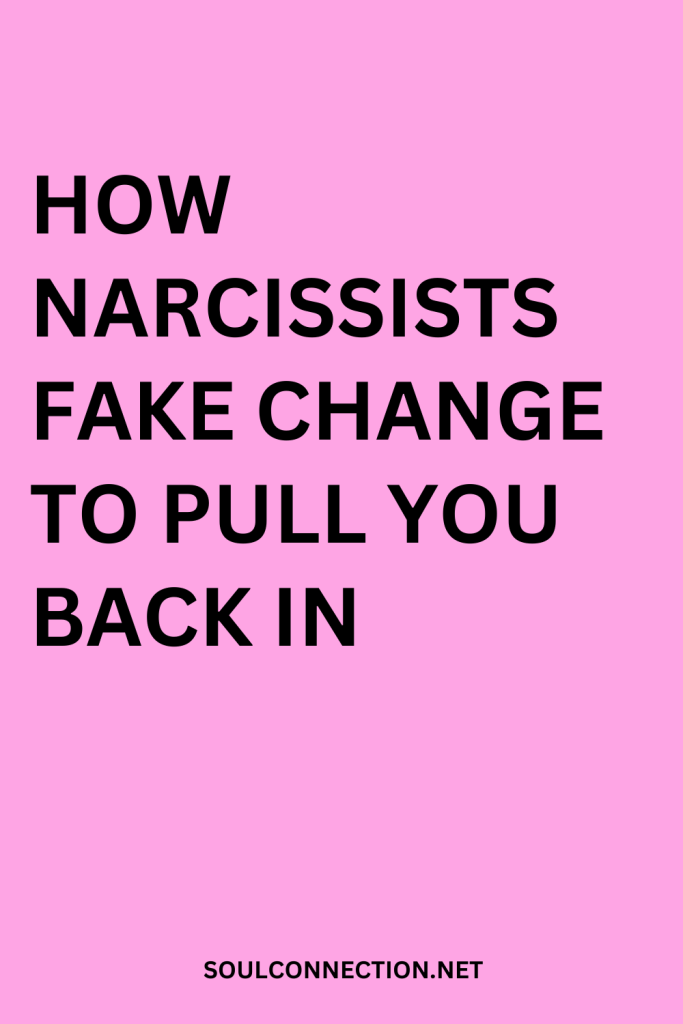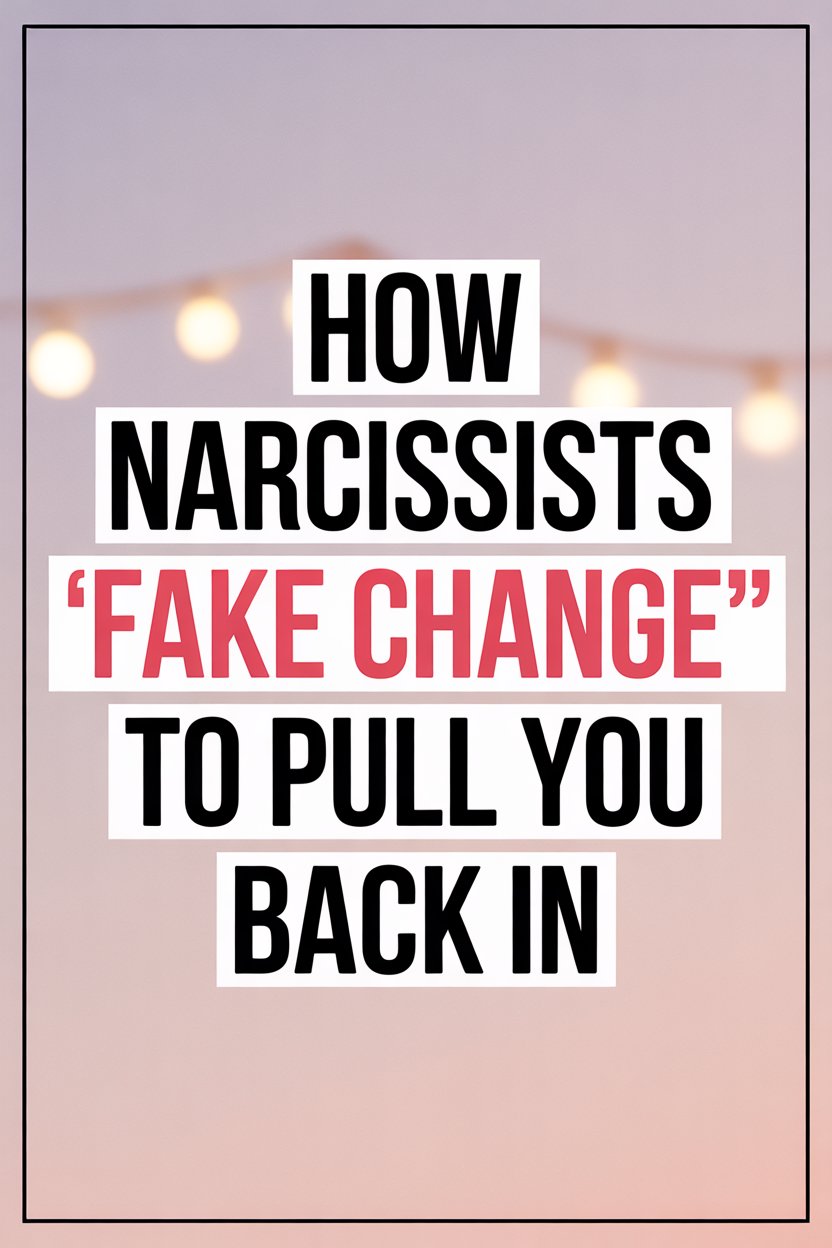Oh, the old “I’ve changed” routine. If you’ve ever dated, befriended, or shared living space with a narcissist, chances are you’ve seen this act before.
You know—the tears, the heartfelt apologies, the accidental quoting of self-help books they probably skimmed just for this moment.
For anyone not personally acquainted with narcissistic behavior, this performance might seem Oscar-worthy. But for those who’ve been burned, it’s all a bit too familiar.
Let’s get down to the tricks, traps, and telltale signs behind this favorite narcissist move.
The Sudden Personality Makeover
One day, the narcissist in your life is a Category 5 emotional hurricane. The next, they’re serving up the sunshine—smiles, compliments, even doing the dishes without being asked.
You might find yourself wondering if you’ve slipped into a parallel universe where your partner actually listens to your feelings.
Nope. What you’re witnessing is a short-lived rebrand. Like a dodgy used car dealership throwing a fresh coat of paint over a lemon, narcissists slap on a shiny new persona when they sense you’re about to walk out the door.
The charm, the consideration, the sudden ability to remember your birthday—these are all part of the show.
This isn’t genuine growth. It’s crisis management, narcissist-style.
The Apology Tour
Nothing says “I’m trying” like a dramatic apology, right? Narcissists will pull out every stop: crocodile tears, trembling hands, a voice quivering with regret.
Some even take it up a notch with long texts at 2 a.m., or maybe a personalized playlist about change and redemption.
Don’t get blindsided by the performance. Look for what’s missing. Real change means owning up to patterns, not just isolated slip-ups.
Listen carefully—do they apologize for what actually hurt you, or just for the fact that you’re upset? Are they promising future magic, or do they actually have a practical plan?
If the apology comes with a list of excuses, or somehow ends up making you feel bad for daring to be hurt, you’re watching the narcissist Olympics.
The Grand Gesture Extravaganza
Nothing says “I’m a changed person” like a surprise weekend getaway. Or a dozen roses delivered to your work. Or, if you’re really lucky, a Facebook post tagging you as “the world’s best partner.” It’s all very sweet on the surface.
Dig a little, though, and it’s easy to spot the catch. Grand gestures are often public or dramatic, designed to sweep you off your feet—and distract you from the actual issues.
Gifts and trips are lovely, but they don’t address disrespect, gaslighting, or a total inability to admit fault.
If you’re wondering why you’re being love-bombed right after a breakup or a big argument, ask yourself: who is this for? If the answer isn’t “me,” but rather “their ego,” you’ve cracked the code.
Miraculous Self-Help Obsession
Suddenly, they’re quoting Brené Brown. They’ve got a new therapist, a shelf full of mindfulness books, and a calendar packed with workshops about empathy.
For a hot minute, you might even feel hopeful—this time they mean it, right?
Well, maybe. But for true change, the work happens when no one is watching. If their newfound self-help journey seems designed to win you back (or, even better, to win Instagram likes), beware.
Narcissists know how to say the right things, but sustained effort and quiet accountability? Not exactly their wheelhouse.
Change that’s real is slow, clunky, and often un-Instagrammable. Watch for those moments, not just the public declarations.
The “I’ve Hit Rock Bottom” Monologue
Right on cue, the narcissist reveals a tragic tale of personal suffering. They’re at their lowest. They really, really need your help and forgiveness to “become a better person.” Cue the violins.
This is classic manipulation, dressed up as vulnerability. Narcissists often weaponize their own pain to reset the power dynamic.
Suddenly, you’re not reviewing their bad behavior—you’re rushing to save the day, yet again.
Keep your empathy, but don’t lose your perspective. A true turning point comes with boundaries, self-reflection, and a willingness to get help—on their own, not just because it keeps you around.
Playing the Victim Card
Watch how quickly the script flips. The narcissist who was once ice-cold now looks heartbreakingly misunderstood. “No one has ever tried to help me.” “Everyone leaves.” “Maybe I just ruin everything.”
Cue the guilt trip. It’s a strategic pivot designed to make you question your own boundaries. If you find yourself apologizing for wanting respect, or patching up their feelings instead of your own, it’s time to step back.
This tactic is equal parts emotional blackmail and Jedi mind trick. It’s not about fixing the relationship—it’s about keeping control.
Rewriting History
Suddenly, the past looks very different through the narcissist’s lens. Arguments are minimized or recast entirely.
“It wasn’t that bad.” “You’re remembering it wrong.” Or the gold standard: “If only you’d told me sooner, I never would have done that.”
If you start doubting your own memory, take a deep breath. Gaslighting is alive and well in the narcissist’s playbook. Changing the story isn’t a sign of accountability; it’s a way to create confusion and buy time.
No amount of fake change can erase what actually happened. If the facts keep shifting, trust your own truth.
Recruiting Allies
When the narcissist senses you slipping away, suddenly mutual friends, family members, even your dog-walker start chiming in: “They’re really trying.” “Give them another chance.” “Nobody’s perfect.”
This is the narcissist’s charm offensive at work, a campaign to win over your social circle and make you feel isolated in your doubts.
If you’re hearing more about their progress from everyone except them, it’s a sign the change is mostly for show.
Relationships should be private efforts, not team sports. If you feel pressure from the peanut gallery, hold your ground.
Spotting Real Change Versus Fake Change
Amid all the noise, how do you tell real growth from a narcissist’s con job? Look for consistency, humility, and follow-through.
Genuine change is boring—think fewer fireworks, more daily effort. Boundaries are respected. Accountability is ongoing. You’re not managing their feelings, or carrying the emotional load alone.
Ask yourself: is this change sustainable? Does it last longer than an election cycle? Or is it just enough to reel you back in before old habits return?
Patience is your best friend here. Watch, wait, and see what happens without being rushed. Narcissists want quick wins. Real improvement takes time.
Taking Back Your Power
No one deserves to be yanked around on a narcissist’s emotional bungee cord. If you’re finding yourself caught in the cycle of promises and letdowns, remember: choosing yourself isn’t selfish. It’s survival.
Trust actions, not words. Set boundaries like your well-being depends on it—because it does. Seek support from folks who truly see you, not just the highlight reel.
And if the temptation to give them “one last chance” creeps in, remind yourself how many finales this soap opera has already had.
Growth looks like freedom, not frantic hope.
When It’s Time to Walk (and Mean It)
Getting pulled back in by a narcissist’s fake change is exhausting, but you’re not alone. Anyone can fall for the act—especially when the love bombing is loud and the promises are big.
What matters is what happens next. You deserve a partner (or friend, or family member) who does the work, not one who just talks about it.
Don’t let showy gestures or perfectly scripted apologies cloud your judgment. You’re allowed to expect effort, accountability, and real change—not just a dazzling performance.
The next time you spot the narcissist’s “new leaf,” remember: not every magic trick is worth watching twice.


